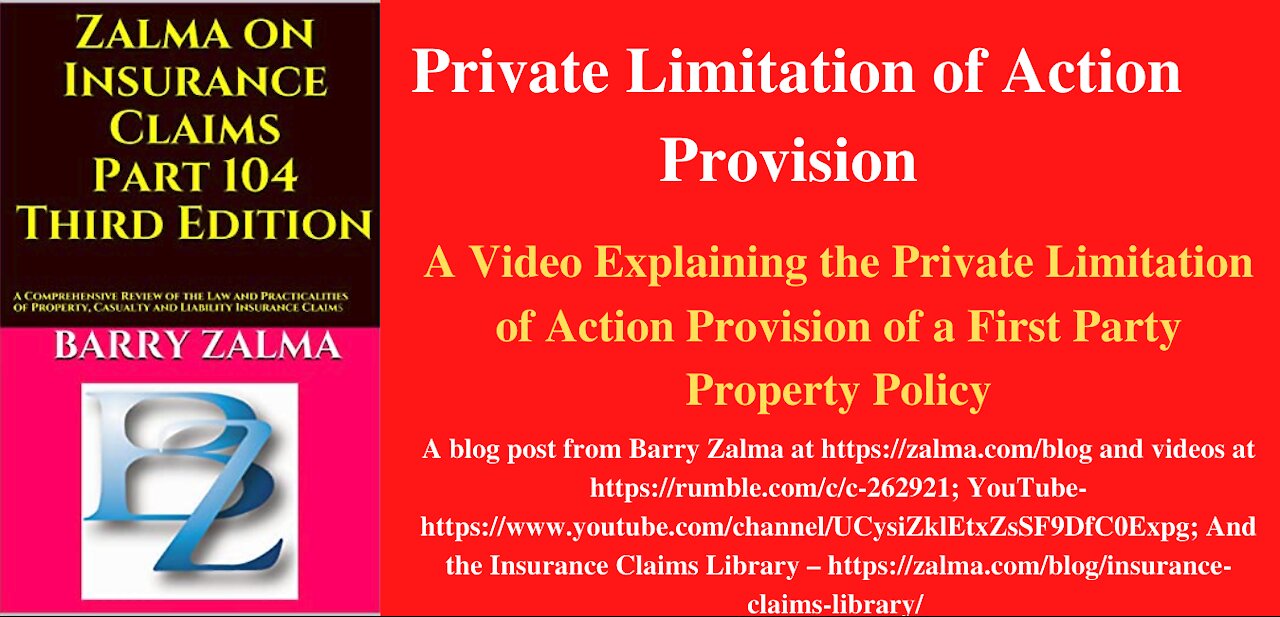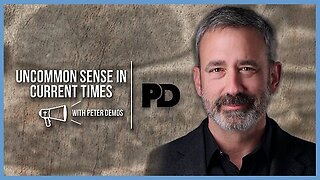Premium Only Content

A Video Explaining the Private Limitation of Action Provision of a First Party Property Policy
Private Limitation of Action Provision
The phrase, “inception of the loss” in the standard fire insurance policy has been interpreted to mean the occurrence of the casualty or event insured against must, if a claim is denied, a suit must be filed within one or two years of the date of the inception of the loss. The law is clear that in most situations the limitation period will be enforced.
The Sixth Circuit held that a one-year limitations period after the inception of loss or damage in an insurance contract did not conflict with Kentucky law and was reasonable. [Smith v. Allstate Ins. Co., 403 F.3d 401, 402-04 (6th Cir. 2005); Miller v. Seneca Specialty Ins. Co. (W.D. Ky., 2019)]
The inception of loss means “the time when the loss was first incurred or began to accrue.” [Tucker v. State Farm Mut. Auto Ins., 2002 UT 54, ¶¶ 13-14, 53 P.3d 947].
In Oregon, the Supreme Court held that “[t]he loss occurs and has its ‘inception’ whether or not the insured knows of it.” See also Zuckerman v. Transamerica Ins. Co., supra, 133 Ariz. at 145 (“the phrase ‘inception of the loss’ is not ambiguous and clearly denotes the time at which the loss occurs”). Moore v. Mutual of Enumclaw Insurance Co., 317 Or. 235, 855 P. 2d 626 (Or. 07/29/1993).
An insured's suit on the policy will be deemed timely if it is filed within one year after “inception of the loss,” defined as that point in time when appreciable damage occurs and is or should be known to the insured, such that a reasonable insured would be aware that his notification duty under the policy has been triggered. “Once any damage becomes reasonably apparent the time begins to run, even if the full extent of the damage is unknown. The inception of the loss occurs when the insured should have known that “Appreciable Damage” had occurred, not when the homeowner learned the true extent of the damage.” (Doheny Park Terrace Homeowners Assn., Inc. v. Truck Ins. Exchange 132 Cal.App.4th 1076, 34 Cal. Rptr. 3d 157 (2005) and Prudential-LMI Com. Ins. v. Superior Court, 51 Cal. 3d 647, 798)
An insured's belated discovery of potential coverage is irrelevant to the inception of loss date. [Abari v. State Farm Fire & Casualty Co. 205 Cal.App.3d 530, 535 Cal. Rptr. 565 (Ct. App. 1988)]
The limitations period is tolled in California from the time the insured gives notice of the damage to the insurer until the insurer formally denies coverage. “This has been construed to mean ‘unequivocal’ denial in writing.” [Migliore v. Mid–Century Ins. Co. 97 Cal.App.4th 592, 118 Cal. Rptr. 2d 548 (2002)] “The reason for the tolling rule is to avoid penalizing the insured for the time consumed by the insurer investigating the claim, while preserving the ‘central idea of the limitation provision that an insured will have only 12 months to institute suit.’” [Marselis v. Allstate Ins. Co. 121 Cal.App.4th 122, 16 Cal. Rptr. 3d 668 (2004)] There is no requirement, however, that the insurer take “firm, unmovable positions” [Liberty Transport, Inc. v. Harry W. Gorst Co. 229 Cal.App.3d 417, 280 Cal. Rptr. 159 (Ct. App. 1991)] or use particular “magic” words, even the word “deny” to achieve the requisite unconditional denial.
The 12-month private limitations of action provision of first party property policies has been upheld as valid and enforceable by every California Appellate Court, and almost every court in every state that has been asked to consider it. Only one California court and some courts in other jurisdictions cited by it have extended the statutory 12-month limitation. [Zurn, supra.] Other jurisdictions apply a much more liberal interpretation construing “inception of the loss” generally in terms equating the phrase with accrual of a cause of action against the insurer.
© 2021 – Barry Zalma
Barry Zalma, Esq., CFE, now limits his practice to service as an insurance consultant specializing in insurance coverage, insurance claims handling, insurance bad faith and insurance fraud almost equally for insurers and policyholders.
-
 7:40
7:40
Barry Zalma, Inc. on Insurance Law
10 months agoLoss of Inventory by Bankruptcy
137 -
 5:45:38
5:45:38
80sKiid
7 hours ago $26.98 earnedFirst stream on RUMBLE!!!!!
90.8K5 -
 3:56:31
3:56:31
JakeParker
7 hours ago $13.91 earnedJakeParker is LIVE on Rumble
50.5K -
 8:09:23
8:09:23
SpartakusLIVE
9 hours ago $25.35 earnedThe Duke rallies squad for LAUGHS into the night with a SMATTERING of TOXIC banter
83.4K17 -
 1:03:51
1:03:51
Flyover Conservatives
1 day agoGeneration Z’s Revolution: 17 Year Old Author on the Return of Faith, Family, and the End of Feminism - Hannah Faulkner; Economic Update - Dr. Kirk Elliott | FOC Show
46.2K2 -
 1:12:43
1:12:43
Adam Does Movies
11 hours ago $20.94 earnedMoviegoers Are Singing Now! + Lilo & Stitch + Sonic 3 - LIVE!
81.5K7 -
 1:26:05
1:26:05
Donald Trump Jr.
14 hours agoRegime Media Imploding: What’s Next for MSNBC? Plus Michael Knowles & Alex Marlow | TRIGGERED Ep.194
232K227 -
 37:26
37:26
Glenn Greenwald
12 hours agoGlenn Takes Your Questions: On Trump's Cabinet, The G20 Summit, and More | SYSTEM UPDATE LOCALS SPECIAL
94.6K55 -
 2:10:20
2:10:20
We Like Shooting
18 hours ago $2.67 earnedWe Like Shooting 586 (Gun Podcast)
27K1 -
 52:14
52:14
Uncommon Sense In Current Times
13 hours ago $0.84 earned“Pumpkin Pie Politics: Bridging the Thanksgiving Divide to Protect The Family"
20K1